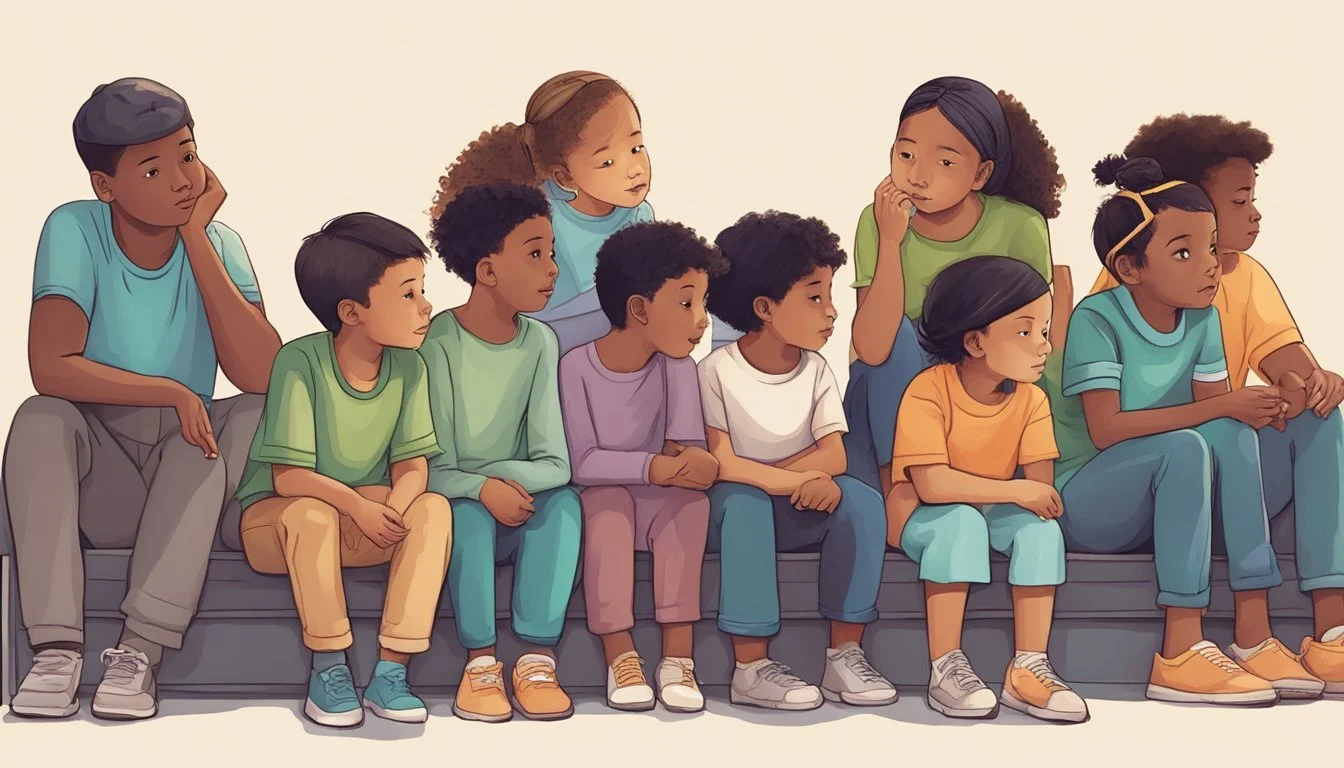7 Unexpected Signs of Intelligence in Children
Hidden Clues Parents Often Miss
Intelligence in children manifests in various ways, often surprising parents and educators alike. While academic performance is commonly associated with high intelligence, there are numerous other indicators that can reveal a child's cognitive abilities. These signs may not always be obvious or traditional, but they provide valuable insights into a child's potential.
Recognizing the unexpected signs of intelligence in children can help parents and caregivers better nurture their intellectual growth and development. By understanding these indicators, adults can provide appropriate support and stimulation to foster a child's unique talents and abilities. This article explores seven surprising signs that may indicate above-average intelligence in children, offering a fresh perspective on identifying and nurturing young minds.
1) Advanced problem-solving skills
Children with high intelligence often display exceptional problem-solving abilities. They approach challenges with creativity and resourcefulness, finding unique solutions to complex issues.
These young minds can break down problems into manageable parts and analyze them from multiple angles. They may use logical reasoning to deduce answers or develop innovative strategies to overcome obstacles.
Intelligent children frequently show a keen interest in puzzles, riddles, and brain teasers. They enjoy the mental stimulation and thrive on finding solutions to tricky questions or situations.
When faced with real-life problems, these children tend to remain calm and methodical. They can identify relevant information, discard unnecessary details, and focus on key elements to reach effective solutions.
Parents and educators may notice these children asking insightful questions about problems, demonstrating their advanced analytical skills. They often show persistence in solving difficult tasks, refusing to give up until they find a satisfactory answer.
2) Exceptional memory retention
Children with exceptional memory retention often display remarkable abilities to recall information. They may remember specific details from events that occurred months or even years ago with surprising accuracy.
This cognitive strength can manifest in various ways. Some children might easily memorize lengthy poems or passages from books after only a few readings. Others might recall complex sequences or patterns with ease.
Exceptional memory in children can extend beyond facts and figures. These kids may have vivid recollections of past experiences, including sensory details like smells, sounds, or visual elements that most people would forget.
Parents and teachers might notice this trait when children effortlessly remember instructions or directions given to them. They may also excel in academic subjects that rely heavily on memorization, such as history or foreign languages.
It's important to note that exceptional memory doesn't always correlate with overall intelligence. However, it can be a valuable cognitive tool that supports learning and problem-solving abilities in many areas of a child's development.
3) Creative storytelling abilities
Children with high intelligence often display remarkable storytelling skills. They weave intricate narratives with vivid details and complex plots, showcasing their imagination and cognitive abilities.
These young storytellers frequently incorporate diverse characters and unexpected twists into their tales. Their stories may feature sophisticated themes or moral lessons, reflecting advanced comprehension of human behavior and social dynamics.
Intelligent children often demonstrate an impressive vocabulary in their storytelling. They may use words and concepts beyond their age level, indicating accelerated language development and knowledge acquisition.
The ability to maintain logical consistency throughout a story is another hallmark of intelligent young narrators. They keep track of multiple plot threads and character arcs, demonstrating strong working memory and organizational skills.
Creative problem-solving often shines through in children's stories. They may devise clever solutions for their characters' dilemmas, highlighting their analytical thinking and innovation capabilities.
4) Early reading proficiency
Early reading proficiency is a notable indicator of intelligence in children. Children who demonstrate the ability to read at an advanced level before their peers often exhibit higher cognitive capabilities.
Research has shown that early readers tend to develop enhanced problem-solving skills and creativity. These children frequently display a natural curiosity for words and language, often teaching themselves to read through exposure to books and written materials.
Many early readers continue to excel academically throughout their education. They typically maintain reading levels at or above their grade, showcasing their advanced linguistic abilities.
This early proficiency in reading can also correlate with strong leadership qualities later in life. The ability to process and comprehend complex information at a young age may contribute to developing critical thinking and decision-making skills.
It's important to note that while early reading is a positive sign, it is just one aspect of intelligence. Children develop at different rates, and those who read later can still be highly intelligent in other areas.
5) Strong emotional intelligence
Emotionally intelligent children display a remarkable ability to understand and manage their own emotions, as well as empathize with others. They often exhibit a heightened awareness of social dynamics and can navigate complex interpersonal situations with ease.
These children tend to be more considerate of others' feelings and are quick to offer help or support. They may frequently engage in acts of kindness, such as comforting a upset classmate or volunteering to assist those in need.
Self-awareness is a key component of emotional intelligence in children. They can accurately identify their strengths and weaknesses, which allows them to set realistic goals and adapt to challenging situations.
Children with high emotional intelligence often demonstrate strong communication skills. They express their thoughts and feelings clearly and listen attentively to others, fostering positive relationships with peers and adults alike.
These youngsters typically show greater resilience in the face of setbacks. They can regulate their emotions effectively, bouncing back from disappointments and maintaining a positive outlook on future challenges.
6) Advanced pattern recognition
Children with high intelligence often display an exceptional ability to recognize and analyze patterns. This skill goes beyond simple repetitive sequences and extends to complex relationships in various domains.
These children may quickly grasp mathematical patterns, identifying number sequences or geometric relationships with ease. They might also excel at puzzles and logic games that require pattern recognition.
In language, they may pick up on linguistic structures and rules faster than their peers. This can manifest as an aptitude for learning new languages or understanding grammatical concepts intuitively.
Visual pattern recognition is another area where highly intelligent children may shine. They might excel at spotting similarities and differences in images, or quickly solve visual puzzles.
Advanced pattern recognition skills can also appear in social contexts. These children may be adept at noticing behavioral patterns or social cues that others miss.
This ability to recognize patterns across different fields often translates to stronger problem-solving skills. It allows children to make connections and draw insights that may not be immediately obvious to others.
7) Sophisticated sense of humor
Children with advanced intelligence often display a remarkably sophisticated sense of humor. They tend to grasp complex jokes and puns that may elude their peers.
These young minds can create clever wordplay and understand subtle nuances in comedic timing. Their ability to comprehend and generate humor often surpasses what's typical for their age group.
Intellectually gifted children might enjoy more mature forms of comedy, including satire or irony. They can pick up on social and cultural references in jokes that many adults appreciate.
Their advanced language skills allow them to craft witty remarks and engage in playful banter. This verbal agility is frequently a sign of high cognitive functioning and creative thinking.
Humor requires the integration of various cognitive skills, including abstract thinking and pattern recognition. Children who excel in these areas often demonstrate their intelligence through their comedic abilities.
Parents and educators may notice these children's unique capacity to make others laugh through clever observations or unexpected connections. This trait can be an indicator of their advanced cognitive development and social awareness.
Understanding Intelligence in Children
Intelligence in children manifests through various cognitive abilities and behaviors. Theories provide frameworks for understanding intellectual development, while assessment methods aim to measure different aspects of a child's cognitive capabilities.
Theories of Childhood Intelligence
Piaget's theory of cognitive development suggests children progress through distinct stages of intellectual growth. These stages include sensorimotor, preoperational, concrete operational, and formal operational. Each stage builds upon the previous one, reflecting a child's expanding mental abilities.
Vygotsky's sociocultural theory emphasizes the role of social interaction in cognitive development. This approach highlights how children learn through guided participation with more skilled individuals, often adults or older peers.
Gardner's theory of multiple intelligences proposes eight distinct types of intelligence, including linguistic, logical-mathematical, spatial, musical, bodily-kinesthetic, interpersonal, intrapersonal, and naturalistic.
Measuring Intelligence in Children
IQ tests are common tools for assessing cognitive abilities in children. These tests evaluate various skills such as verbal comprehension, perceptual reasoning, working memory, and processing speed.
Alternative assessment methods include:
Observational techniques
Portfolio evaluations
Performance-based assessments
Standardized achievement tests measure specific academic skills and knowledge. These assessments help identify areas where a child excels or may need additional support.
Adaptive behavior scales evaluate a child's practical, everyday skills and their ability to function independently in various environments. These assessments complement cognitive measures to provide a more comprehensive understanding of a child's capabilities.
Social and Emotional Indicators
Intelligence in children often manifests through unexpected social and emotional behaviors. These indicators can reveal a child's advanced cognitive development and heightened awareness of themselves and others.
Advanced Empathy and Emotional Awareness
Highly intelligent children frequently display a remarkable ability to understand and respond to others' emotions. They may show unusually deep concern for peers or family members who are upset. These children often use sophisticated language to describe feelings, going beyond simple "happy" or "sad" descriptors.
They might demonstrate surprising insight into complex social situations, offering astute observations about group dynamics or interpersonal conflicts. Emotionally intelligent kids are often skilled at reading non-verbal cues and can pick up on subtle changes in mood or atmosphere.
Their advanced empathy may lead them to take on mediator roles in conflicts or show exceptional kindness to those in need. This emotional maturity can sometimes make it challenging for them to relate to peers who haven't developed the same level of awareness.
Sophisticated Social Interactions
Intelligent children often exhibit social skills that seem beyond their years. They may engage in conversations with adults on equal footing, discussing complex topics or using advanced vocabulary. These children frequently seek out older playmates or prefer the company of adults.
They might show a keen interest in social justice issues or demonstrate a nuanced understanding of fairness and equality. Highly intelligent kids often excel at collaborative problem-solving, taking leadership roles in group activities or showing exceptional teamwork skills.
Their social sophistication can manifest in clever humor, witty remarks, or the ability to adapt their communication style to different audiences. However, this advanced social awareness may sometimes lead to feelings of isolation or difficulty connecting with same-age peers who don't share their interests or communication level.
Cognitive and Creative Signs
Highly intelligent children often exhibit unique cognitive abilities and creative expressions that set them apart from their peers. These traits manifest in their approach to problem-solving and artistic endeavors.
Unusual Problem-Solving Skills
Gifted children frequently display unconventional approaches to solving problems. They may find innovative solutions that adults overlook or develop strategies that seem advanced for their age. These children often show a knack for puzzles, riddles, and complex games.
Their analytical skills tend to be sharp, allowing them to break down problems into manageable parts. They might ask probing questions or seek out additional information to tackle challenges.
Some intelligent children demonstrate an ability to see patterns and connections that others miss. This skill can lead to creative problem-solving in various areas, from mathematics to social situations.
Creative Expressions Beyond Age Level
Highly intelligent children often showcase creativity that surpasses typical age expectations. Their imaginative play might be more elaborate, with intricate storylines and detailed characters.
These children may excel in artistic pursuits, producing drawings, paintings, or sculptures that display advanced techniques or concepts. Their creative writing might feature complex plots, rich vocabulary, or unique perspectives.
Musical aptitude is another area where gifted children may shine, showing an early grasp of rhythm, melody, or composition. Some might create original songs or learn to play instruments with surprising ease.
Verbal creativity is common, with these children often enjoying wordplay, puns, or inventing new languages. Their humor may be more sophisticated, appealing to adults as well as peers.
Environmental and Behavioral Factors
A child's intelligence is influenced by their surroundings and actions. Certain environmental conditions and behavioral traits can indicate higher cognitive abilities in young minds.
Adaptability to New Environments
Children who easily adjust to new situations often demonstrate higher intelligence. This adaptability manifests in various ways:
• Quick acclimation to unfamiliar settings like new schools or social groups • Flexible problem-solving when faced with unexpected challenges • Ability to understand and follow new rules or routines rapidly
Adaptable children typically show less stress in novel environments. They may ask insightful questions to gather information and orient themselves.
These traits indicate advanced cognitive processing and emotional regulation skills. Such children often excel in diverse learning environments and social situations.
Curiosity and the Pursuit of Learning
Highly intelligent children frequently display an insatiable curiosity about the world around them. This manifests through:
• Asking thought-provoking questions beyond their age level • Seeking out new information independently through books, documentaries, or experiments • Showing enthusiasm for learning about a wide range of topics
Curious children may engage in self-directed learning activities. They often dive deep into subjects that interest them, absorbing complex information with ease.
This thirst for knowledge drives cognitive development. It fosters critical thinking skills and a broad knowledge base, key components of intelligence.







